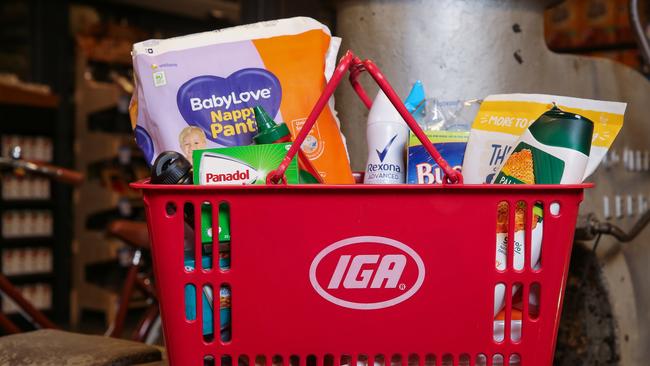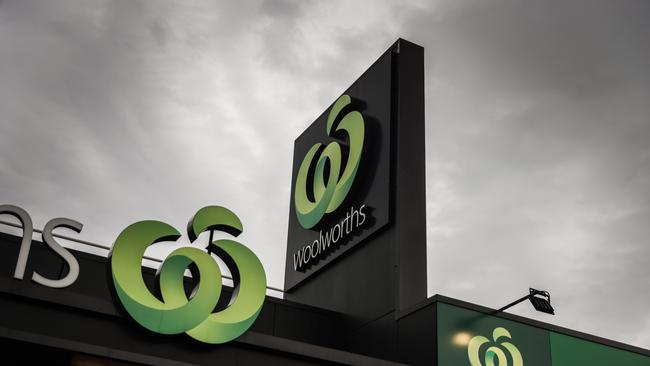Woolworths, Coles accused of ‘land banking’ to strangle competition
The Metcash boss of supermarkets says Woolworths and Coles buy up land, properties and shopping centres just to turf out tenanted independent supermarkets.

The nation’s largest supermarket chains Woolworths and Coles have been accused of using their financial muscle and dominant market power to scoop up land, properties and shopping centres, in a practice known as ‘land banking’, to shut out competition and gain a stranglehold on a neighbourhood.
The issue of land banking is emerging as a key issue before the Senate inquiry into the supermarkets with senators told on Thursday in a public hearing of both of the majors pursuing this property play to snuff out competition, especially from smaller supermarkets such as independents that don’t have the resources to buy land. This was especially the case when both Woolworths and Coles paid highly inflated prices for land or properties just to secure them.
It is likely when Woolworths chief executive Brad Banducci and Coles boss Leah Weckert appear before the Greens-led Senate inquiry on Tuesday, they will face a grilling over a number of land banking allegations now handed to the senators on the inquiry committee.
On Thursday at the inquiry’s public hearings in Canberra, the head of supermarkets for Metcash, Grant Ramage, provided a ‘real world’ example of land banking which saw a popular and successful independent supermarket in Brighton, South Australia, almost losing its store after Coles made a play to buy the site.
Mr Ramage said Metcash, a supermarket, liquor and hardware wholesaler whose banners include IGA and Foodland, was forced to step in and purchase the Brighton property in Adelaide to stop Coles buying it and possibly throwing out the independent supermarket operating at that site.

Metcash was also forced to match an inflated price to keep Coles from grabbing it, he told senators. Metcash then sold the property to an independent supermarket operator at a lower price, taking a loss on the deal.
In response, Coles later told The Australian it was always searching for new locations to reach shoppers.
“We’re constantly exploring opportunities in our store network to ensure we deliver the best shopping experience for customers in locations which are convenient to them,” a Coles spokeswoman said.
A spokesman for Woolworths told The Australian its customers would expect it to build new stores, distribution centres and other facilities with the number of new stores in recent years mirroring population growth.
“Most of our developments in the past five years have been in greenfield areas, including growth corridors, and around a third have been in urban areas that aredensifying. Our focus is on our business - strengthening our network of stores and better servicing communities - not on the business or plans of our competitors.”
Mr Ramage said his experiences were examples of “land banking” both Coles and Woolworths pursued to keep out competition.
He said the store in South Australia was very successful, and Metcash became alarmed when Coles attempted to buy it. Coles offered a very high price for the site, which Metcash was forced to match, just to keep Coles from ultimately buying it.
Mr Ramage said that Metcash told the Australian Competition & Consumer Commission about the attempt by Coles to grab the South Australian property, but given concerns the regulator didn’t have the power to act, it stepped in and bought the property.
Earlier in the day, Mr Ramage accused Woolworths and Coles of unchecked growth, fuelled by buying up independent supermarket stores to take them over - often paying inflated prices just to grab these stores - or if unable to buy the store then purchase the land underneath it.
Mr Ramage said competition law in Australia had failed to stop this “unchecked growth”, adding that the supermarket giants were engaging in land banking and uncompetitive behaviour.

Mr Ramage said there were multiple instances where Woolworths and Coles were using their financial strength to buy up land, also known as land banking, to keep competitors out of the market and particular catchments around Australia.
“Firstly, the chains try to buy successful independent stores, that removes critical scale from our network, and they are often prepared to pay significantly inflated prices, far more than any other independent could afford to pay.
“If they can’t buy the store, then they try to buy the property,” Mr Ramage said. “They then turf out the independent at the end of the lease, even when they own multiple stores in that locality.”
He said the majors also ask for, and get, special zoning laws which undermines the zoning laws, impact traffic flows and hurt local businesses.
“By land banking and tying up valuable sites, the supermarkets are successfully protecting this behaviour into the future and protecting themselves from competition.”
Aldi Australia chief executive Anna McGrath told the Senate inquiry that when the German discounter first entered the market in 2001 it was difficult to open stores in certain areas due to zoning laws.
However, changes to zoning restrictions, including making it easier for Aldi to open its stores in shopping centres, had helped it expand further to now have 590 stores across the country, she said.
Ms McGrath said the allegation that Woolworths and Coles were engaging in land banking had not hindered Aldi’s expansion.
Aldi has had “steady growth” in Australia over the last two decades, she said.
Ms McGrath was asked by the Senate inquiry chairman Nick McKim about the impact of divestiture powers, with the Greens introducing legislation to allow the courts to force a corporation, such as the major supermarkets, to divest assets if they are deemed to be misusing market power or to have grown too powerful.

Ms McGrath said she has concerns about the unintended consequences on jobs and consumer choice of divestiture legislation that would force the major supermarket chains to sell off parts of their businesses.
She said recent comments on divestiture powers by former Federal Labor minister Craig Emerson, who is currently conducting a review of the food and grocery code of conduct, were “thought-provoking”.
“Regarding the unintended consequences that could come from divestiture, and what we wouldn’t want to see is consumers having less choice or there being less jobs in retail or suppliers,” Ms McGrath said.






To join the conversation, please log in. Don't have an account? Register
Join the conversation, you are commenting as Logout